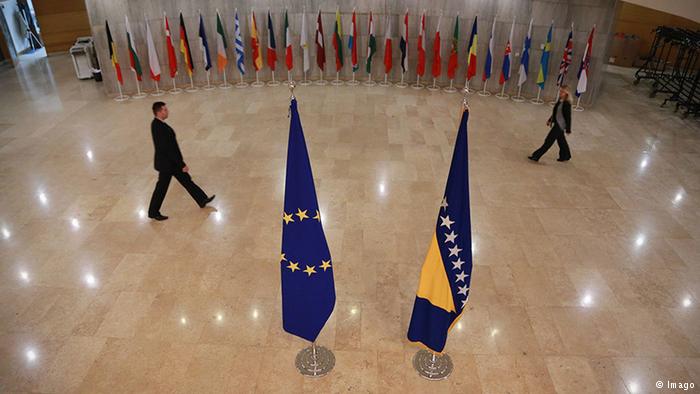21.09.2016
EU Observer
Western powers have urged Bosnian Serbs to abandon a referendum that threatens to destabilise the country and to put in doubt its EU prospects.
"We once again urge the RS [Republika Srpska] authorities not to hold the referendum … The decision of the BiH [Bosnian] Constitutional Court will remain fully in force and must be respected”, the Western countries’ ambassadors said in a joint statement on Tuesday (20 September).
"Republika Srpska will remain an integral and essential part of the sovereign state of BiH … [and] there will be no redrawing of the map”, they added.
The statement was signed by the envoys of Canada, France, Germany, Italy, Japan, Turkey, the UK, and the US, who sit on the steering board of the Peace Implementation Council (PIC), an international body created in 1995 to oversee Bosnia’s post-war peace deal, the Dayton agreement.
RS, the Serb part of the Bosnian federation, aims to hold a referendum on 25 September on whether it can mark its national holiday on 9 January.
The constitutional tribunal, last year, said it cannot because that day marks its unilateral declaration of independence from Bosnia in 1992 in one of the events that led to the 1990s conflict.
The court said that if it went ahead, it would make Bosniaks and Croats who now live in RS feel unsafe.
But the real stakes are higher, because if the referendum undermines the court’s authority, it could lead to RS splitting from Bosnia and the unravelling of the Dayton deal.
Russia, which is also a member of the PIC board, refused to undersign Tuesday’s statement.
Milorad Dodik, the RS president and the main force behind the referendum, will also meet Russian leader Vladimir Putin in Moscow on Thursday, amid concern in EU circles that Russia is trying to stir up trouble in the Balkans in order to disrupt EU integration or to create bargaining chips to use in other theatres.
The PIC appeal on Tuesday came the same day that EU states, in Brussels, formally accepted Bosnia’s application for EU membership.
Their statement reaffirmed that “the future of the Western Balkans lies in the European Union” and the EU’s “unequivocal commitment to Bosnia and Herzegovina's EU perspective as a single, united and sovereign country”.
It urged Bosnia to press ahead with “socio-economic reforms … [and] reforms in the area of rule of law and public administration."
It also urged it to fall in line with a 2009 ruling by the Court of Human Rights in Strasbourg to let people of Roma and Jewish ethnicity to run for high office.
The EU states “invited” the European Commission to “submit its opinion” on Bosnia’s eligibility to join.
The process, which can take one year or more, will see EU officials send detailed questionnaires to Zagreb in order to assess what conditions it would need to meet in future EU accession talks.
It could still take years before the negotiations start, let alone end, however, with the EU statement adding that “each country's progress towards the European Union depends on its individual efforts”.
Most places in the Balkans, with the exception of Kosovo, are already further down the road to accession.
But the referendum crisis in Bosnia, unrest in Kosovo over relations with Serbia and with Montenegro, and a protracted political crisis in Macedonia have increased the risk of a return to violence.
Speaking in the Croatian town of Split on Saturday, Petr Pavel, a Czech general who heads Nato’s military committee, said the Western Balkans remained “far from stable”.
His remark upset Serbian prime minister Aleksandar Vucic, a former nationalist who has so far failed to use his influence over Dodik to halt next week’s Bosnia vote.
"We have already seen what all that [instability] looked like 17 years ago [during the Yugoslav wars] ... they should not threaten us, because we have not threatened anyone," Vucic said on Monday, having taken Pavel’s comment as a personal rebuke.
Vucic, who also has strong ties with Russia, added that the EU and Nato “should not worry because they have a serious and responsible leadership” in Serbia.
https://euobserver.com/foreign/135176
No comments yet.
-
 KAZAKHSTAN TO CONTINUE GREEN ENERGY DEVELOPMENT REGARDLESS OF OIL PRICES
Asia - Pacific
21.09.2016
KAZAKHSTAN TO CONTINUE GREEN ENERGY DEVELOPMENT REGARDLESS OF OIL PRICES
Asia - Pacific
21.09.2016
- OBAMA ADMINISTRATION CONSIDERS ARMING SYRIAN KURDS AGAINST ISIS Iraq 21.09.2016
- OPINION: A DISGRACE FOR EUROPE Europe - EU 21.09.2016
- FOREIGN MINISTRY: AZERBAIJAN SUPPORTS UKRAINE’S SOVEREIGNTY The Caucasus and Turkish-Armenian Relations 21.09.2016
-
 EU ACCEPTS BOSNIA AND HERZEGOVINA'S MEMBERSHIP APPLICATION
The Balkans
21.09.2016
EU ACCEPTS BOSNIA AND HERZEGOVINA'S MEMBERSHIP APPLICATION
The Balkans
21.09.2016
-
25.01.2016
THE ARMENIAN QUESTION - BASIC KNOWLEDGE AND DOCUMENTATION -
12.06.2024
THE TRUTH WILL OUT -
27.03.2023
RADİKAL ERMENİ UNSURLARCA GERÇEKLEŞTİRİLEN MEZALİMLER VE VANDALİZM -
17.03.2023
PATRIOTISM PERVERTED -
23.02.2023
MEN ARE LIKE THAT -
03.02.2023
BAKÜ-TİFLİS-CEYHAN BORU HATTININ YAŞANAN TARİHİ -
16.12.2022
INTERNATIONAL SCHOLARS ON THE EVENTS OF 1915 -
07.12.2022
FAKE PHOTOS AND THE ARMENIAN PROPAGANDA -
07.12.2022
ERMENİ PROPAGANDASI VE SAHTE RESİMLER -
01.01.2022
A Letter From Japan - Strategically Mum: The Silence of the Armenians -
01.01.2022
Japonya'dan Bir Mektup - Stratejik Suskunluk: Ermenilerin Sessizliği -
03.06.2020
Anastas Mikoyan: Confessions of an Armenian Bolshevik -
08.04.2020
Sovyet Sonrası Ukrayna’da Devlet, Toplum ve Siyaset - Değişen Dinamikler, Dönüşen Kimlikler -
12.06.2018
Ermeni Sorunuyla İlgili İngiliz Belgeleri (1912-1923) - British Documents on Armenian Question (1912-1923) -
02.12.2016
Turkish-Russian Academics: A Historical Study on the Caucasus -
01.07.2016
Gürcistan'daki Müslüman Topluluklar: Azınlık Hakları, Kimlik, Siyaset -
10.03.2016
Armenian Diaspora: Diaspora, State and the Imagination of the Republic of Armenia -
24.01.2016
ERMENİ SORUNU - TEMEL BİLGİ VE BELGELER (2. BASKI)
-
AVİM Conference Hall 24.01.2023
CONFERENCE TITLED “HUNGARY’S PERSPECTIVES ON THE TURKIC WORLD"









